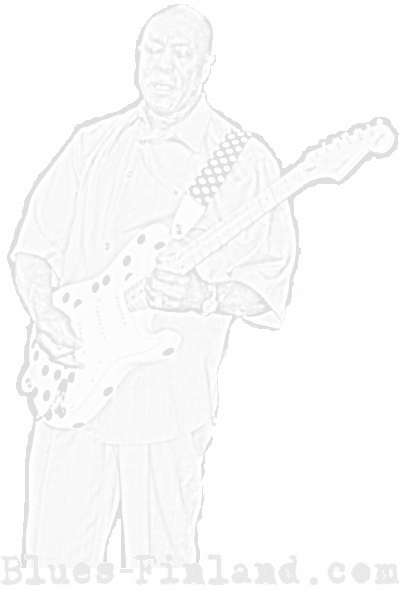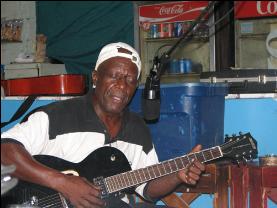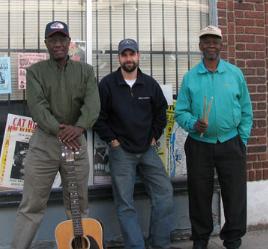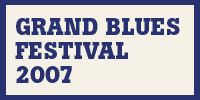 |
| (c) 2007 Blues-Finland.com |
| Raw Blues from Mississippi 6 February 2007 The mission of Broke & Hungry Records is to preserve the tradition of country blues. The music has been promoted by the label's artists such as Jimmy "Duck" Holmes and Odell Harris. Andres Roots had a chat with the founder, Jeff Konkel. One of the most praised blues albums in 2006 was "Back To Bentonia" by Jimmy "Duck" Holmes - the first recording of the then 58-year-old Mississippi bluesman, and the inaugural release for Broke & Hungry Records, a country blues label started by St. Louis PR-man and long-time blues fan Jeff Konkel a mere six months earlier. |
 |
| Jimmy "Duck" Holmes |
| By the end of the year, there was another critically acclaimed disc out, "Searching For Odell Harris". "Meet Me In the Cotton Field" by Terry "Big T" Williams and Wesley "Junebug" Jefferson is due to hit the stores in April, with a new album by Jimmy "Duck" Holmes to be expected in early summer. There is also a rumoured film project in the works, which Mr. Konkel remains reluctant to unveil at present; however, he was more than generous to share his thoughts with the readers of Blues-Finland.com on other aspects of the blues business. It says on your website: "Like most great ideas, the concept for Broke & Hungry Records was born in a bar. A juke joint, to be precise." If that's the truth and not just the "veteran public relations practitioner" talking, would you care to elaborate on the occasion? Well, I've been guilty of hyperbole once or twice in my career, but that's actually a true story. I was down in the Delta at Po' Monkey's, a juke joint in Merigold, Mississippi. Big George Brock was there playing a show and his manager, Roger Stolle was there as well. Roger had basically made the decision to record George because no one else was willing to take the chance. Of course, since then, George has emerged as one of the hottest draws on the festival circuit. So this show in Merigold was taking place about a month after RL Burnside – one of my heroes – had died. And as I sat in this juke, swilling cheap beer and chatting with Roger, I stopped lamenting the fact that so many great artists were dying off without getting proper exposure, and I started forming a plan. A couple of weeks later I started Broke & Hungry Records and two weeks after that we cut our first CD. The company motto is "This ain't no way to make a living." So why then? Well I can't say that I wouldn't like to make a living with the label, but that's certainly not the case today. I hold a fulltime job by day and chase my record-impresario dreams at night and on weekends. But at the end of the day, the label isn't about commerce. It's about preserving and promoting an art form that means the world to me. I've been in love with the blues of Mississippi since I was in my late teens, so I'm thrilled to play a small role in keeping it in the public eye. Would you say the lives and performing careers of Jimmy and Odell have changed since your releases brought them intrernational acclaim? For those two guys, you get two very different answers. For Jimmy, there's no doubt that things have changed for him. He's getting festival offers from all around the world, and he's getting a great many visitors to his juke joint in Bentonia, Mississippi, the Blue Front Cafe. He's also becoming a much stronger live performer. He's much more confident and at ease playing in front of large audiences. For Odell, I would say life hasn't changed a bit. I met him when we recorded the album, and I haven't seen him since! He's a very reclusive guy who hasn't shown much interest in a career as a musician. This is very much a hobby for him, which is unbelievable given his talent. He's living in Louisiana where he works as a roofer. Hopefully I'll be able to coax another album out of him in the future, but I won't hold my breath. As far as the music is concerned, your focus on the Mississippi bluesmen of today is well-defined; what about your audience, the customers? Is there an "average customer"? My customers are mostly – although certainly not exclusively – white males, but other than that, there is a lot of variance. We have a lot of young guys buying our records as well as older, lifelong blues fans. We're growing a strong reputation in Europe where the fan base for raw country blues is a lot stronger. We also seem to be doing pretty well on the east coast of the U.S. The thing about this kind of music is that if it hits you, you're a lifelong fan. It hits all different kinds of people. Once lovers of real-deal blues hear our records, they're instant fans. The hard part is spreading the word and making sure they know about us. It is my impression that you have picked up where Fat Possum left off when they drifted into a rock direction; how would you comment on that? That comparison is being made more-and-more frequently these days, and I'm incredibly flattered by it. I'm a huge fan of the label, and if our records can impact others half as much as Fat Possum impacted me, I'd be thrilled. Having said that, we're plowing a slightly different path than Fat Possum. I'm a huge fan of Mississippi hill country blues, but not to the exclusion of other forms of raw country blues. I'm not sure that Jimmy "Duck" Holmes would have ever been a comfortable fit on their label, which seemed more dedicated to the punk blues aesthetic. |
 |
| Jimmy Holmes, Jeff Konkel and Sam Carr. Carr plays the drums on Holmes's album. |
| Have you ever considered watering down the music of your artists with remixes and samples and all that stuff to reach "a wider audience"? No way. I don't know much about what the future holds, but it won't include remixes! Bruce Iglauer of Alligator Records has admitted that most of their sales today come from artists selling CDs at gigs. Is the same true of B&H, and what ways does a blues label have to distribute the music in this day and age? We do pretty well at gigs, but we see a lot of Internet sales, too. I think fans of this kind of music are pretty savvy about searching online for real-deal blues. A lot of our customers are used to searching for obscure pre-war gems and hard-to-find import releases. These aren't customers buying on impulse. They've done their research and they know what they want. |
| Is there any hope of seeing your stars in Europe in the foreseeable future? We're certainly hoping to have some Broke & Hungry Records artists perform in Europe soon. Unfortunately, Jimmy "Duck" Holmes doesn't like to fly, so we've had to turn down some major festivals in France, Italy, Switzerland and the United Kingdom. I'm still hoping he'll warm to the idea at some point. Another of our artists, Terry "Big T" Williams is currently unable to get a passport because of some scrapes with the law in the 1990s. And Odell Harris... Well, I have a hard enough time getting Odell to pick up his phone, let alone board a plane. And people wonder why we call ourselves Broke & Hungry! Would you say the blues scene has changed much in the past ten years, and how do you picture it in another ten? Unfortunately, the last 10 years has seen way too many country blues artists pass on, and there aren't nearly as many younger musicians filling that void. Hell, in the last couple of months alone we've lost legends like Henry Townsend, Homesick James and Robert Lockwood. Having said that, there are a number of little-known guys in the Delta and beyond who are carrying on the older styles. As long as I can afford to keep tracking them down and recording them, I'm going to do so. ANDRES ROOTS Links: Broke & Hungry Records, Broke & Hungry Records MySpace |


